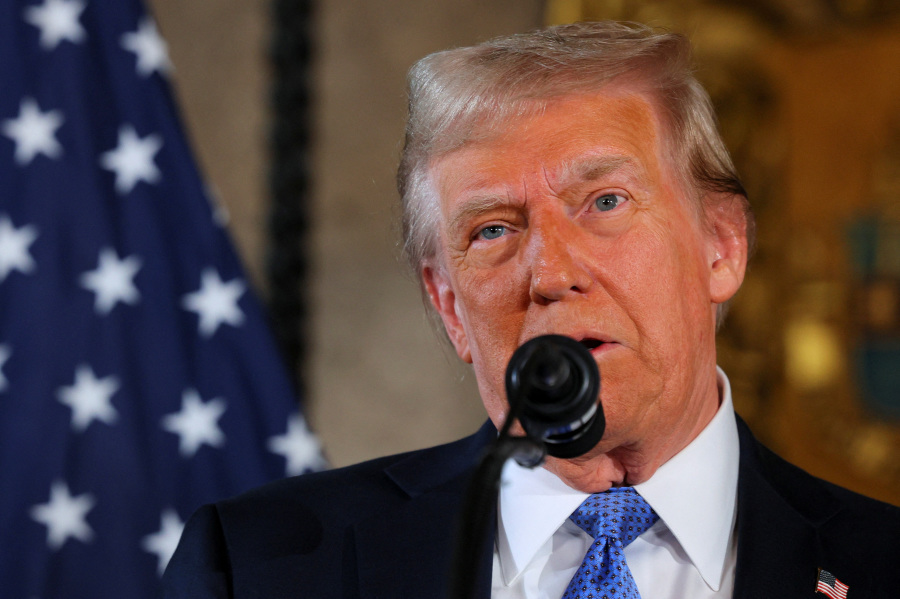(Reuters) - The world's economic reckoning with the incoming administration of U.S. President-elect Donald Trump began in earnest this week, with some Federal Reserve officials penciling in estimates for higher inflation and restrictive interest rates, a surprise resignation in Canada over budgeting for prospective tariffs and a hyper focus on a potential status upgrade for bitcoin.
The Fed cut rates as expected on Wednesday amid a busy year-end run of central bank meetings from Ottawa and Frankfurt to Tokyo and London that showed officials starting to deal with heightened uncertainty ahead of the world's largest economy coming under Trump's leadership early in the new year.
Indeed, Fed officials not only dialed back projections for how much further U.S. borrowing costs can fall in the face of stiffer-than-expected inflation, Fed Chair Jerome Powell said some among them were already taking a shot at judging how Trump's plans such as higher tariffs, lower taxes and a crackdown on immigration might affect their monetary policymaking in the months ahead.
The upshot was U.S. central bankers penciled in estimates for higher growth next year than previously estimated, but also notably higher inflation. That left Powell repeatedly citing a need for "caution" about committing to additional rate cuts from here, a tone that triggered a slide in stock prices and a recalibration of market estimates for further easing: Just a single Fed rate cut is now priced in for 2025.
"Some people did take a very preliminary step and start to incorporate highly conditional estimates of economic effects of policies into their forecasts at this meeting," Powell said in response to a question about the degree to which Trump factored into officials' thinking. "Some people said they didn't do so, and some people didn't say whether they did or not, so we have people making a bunch of different approaches to that but some did identify policy uncertainty as one of the reasons for their writing down more uncertainty around inflation."
Ahead of the Fed decision, rates had already been lowered last week by the European Central Bank and Bank of Canada, with both expected to deliver some additional easing in 2025 amid weakening outlooks.
While ECB President Christine Lagarde was vague about further rate cuts, she went out of her way to emphasize downside risks to growth, including from prospective trade tensions with the United States under Trump.
Meanwhile, rate decisions are due in the coming hours from central banks in Japan, Sweden, Norway and the United Kingdom. A Reuters survey of Japanese businesses published last week showed nearly three-quarters expect Trump to have a negative effect on their operating environment, something Bank of Japan officials may have to reckon with as the world's lone developed central bank still trying to tighten policy.
UPHEAVAL
While Trump may have been just at the periphery of officials' thinking at the Fed in Washington, he was a central focus in Ottawa when Canadian Finance Minister Chrystia Freeland quit after clashing with Prime Minister Justin Trudeau on issues including how to handle possible U.S. tariffs under the next U.S. administration.
Freeland exited on Monday just hours before she was due to present a fall economic update to parliament. The document showed the minority Liberal government had run up a 2023/24 budget deficit of C$61.9 billion, much higher than predicted.
Freeland said the threat of new U.S. tariffs represented a grave danger after Trump last month warned he would issue levies on goods imported from Canada and Mexico of 25% unless the two U.S. neighbors limit the flow of migrants and fentanyl into the U.S.
"That means keeping our fiscal powder dry today, so we have the reserves we may need for a tariff war. That means eschewing costly political gimmicks, which we can ill afford," she wrote in a letter to Trudeau posted on X.
Meanwhile, crypto market enthusiasm for Trump's notion of establishing a strategic reserve of bitcoin was dealt a setback when Powell said the Fed had no legal authority to hold it, adding declaratively that it had no plan to seek a change in the law so that it could.
"That's the kind of thing for Congress to consider, but we are not looking for a law change at the Fed," Powell said.
The remark contributed to a broad slide in crypto-related assets, including a 5% drop in bitcoin itself, its largest decline in more than three months.
(Reporting by Dan Burns and Howard Schneider; Editing by Andrea Ricci)









News magazine bootstrap themes!
I like this themes, fast loading and look profesional
Thank you Carlos!
You're welcome!
Please support me with give positive rating!
Yes Sure!